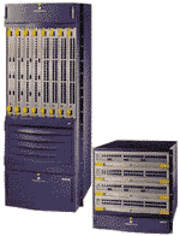Professional Enterprise and Backbone Switches
Berkeley / Fore / Marconi
The ESX-2400/4800 family was originaly designed 1996 from Berkeley Networks. In 1998 Berkeley Systems was bought from Fore Systems. Later in 2000, Fore Systems was bought from Marconi Systems.
As the network experts know, these switch engines were developed and designed from absolute speed "fetischists" (we call them gurus) with the highest demand on super performance. We did evaluate the hardware and did load all the chip documentation as available on the homepages of the manufacturers. In early 1998 they did use Rambus technology to speed up the speed handling and more.
The basic switch fabric and all daughterboard modules have a common design for both series, the 2400 and 4800.
Berkeley Networks was founded in June 1996 in Milpitas, California.
The company has been a developer of multi-Gigabit Application Aware Routing Switches for use by enterprises and ISP´s. Berkeley Networks' products have been the first in the industry to support integrated directory enabled networking, policy management, line-rate firewall switching, and stateful application flow classification, based on a Integrated Network Services architecture.
In Nov. 1997 Berkeley Networks, a start-up developing network switches and integrating the Windows NT network operating system, raised US$8.8 million in a second round of venture capital funding.
Berkeley claims its product architecture will provide application-aware-switching, as well as routing, security, management and directory services based on Microsoft's "Steelhead" routing software and Windows NT. Initial products for the enterprise LAN market are expected to be introduced in January 98.
In Jan. 1998 Berkeley Networks introduced a new class of enterprise internetworking devices that embed Windows NT Server -- including Microsoft's routing and remote access services -- into an "application aware" switching platform.
Custom ASICs are used to look up and resolve Layer 4, Layer 3 and Layer 2 packet information in parallel, providing visibility and control over applications as they flow through the network. This allows the switch to learn which ports are associated with specific applications. The ASICs are designed for wire-speed routing and switching on up to 48 ports of Gigabit Ethernet or 384 ports of Fast Ethernet. Performance is stated at up to 70 million pps at Layers 2, 3 and 4. The Berkeley Networks' design supplements the native Windows NT Server routing protocol suite with IEEE 802.1d (spanning tree) bridging, IEEE 802.1q virtual LAN capability and IEEE 802.1p traffic prioritization.
Support for multicasting, quality of service, and routing policy is planned for a future release. Beginning in March, Berkeley Networks plans to offer eight-slot and four-slot systems. An eight-slot model will provide a combination of 3 to 48 Gigabit Ethernet ports or 24 to 384 Fast Ethernet ports (entry level pricing begins at US$40,000 for 48 Fast Ethernet ports). The four-slot chassis model provides a combination or 3 to 24 Gigabit Ethernet ports or 24 to 192 Fast Ethernet ports (entry level pricing begins at US$30,000 for 48 Fast Ethernet ports).
Gigabit Ethernet ports cost US$3,500 in fully populated systems. The company is a San Jose, California based start-up with funding from SunAmerica, New Enterprise Associates, Information Technology Ventures and Advanced Technology Ventures, Vantage Point Partners and Intel.
Fore Systems, a Pittburgh, Pennsylvania based networking firm, was an ATM company before they bought Berkeley. It was long a bastion of high-speed asynchronous transfer mode (ATM) networking technology based on "cells". Fore paid $250 million for this startup in end of 1998.
Maconi Systems ??

